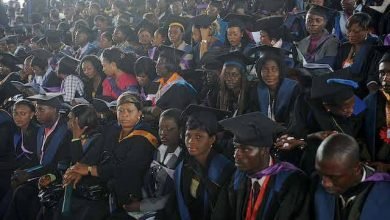Lagos, the most populous city in Nigeria, offers a wide range of educational opportunities, including State Colleges of Education.
These institutions play a crucial role in providing quality education and training to aspiring teachers and other educational professionals.
In this blog post, we will explore the list of State Colleges of Education in Lagos and provide details about the courses they offer.
Contents
State Colleges of Education in Lagos
- Lagos State University (LASU)
- Lagos State Polytechnic (LASPOTECH)
- Lagos State College of Science and Technology (LASCTECH)
- Lagos State College of Arts and Science (LASCAS)
- Lagos State College of Education (LASCOE)
- Lagos State College of Agriculture and Technology (LASCOT)
- Lagos State College of Agriculture and Technology, Epe (LASCATE)
- Lagos State College of Science and Technology, Epe (LASCATE)
- Lagos State College of Agriculture and Environmental Studies (LASCAES)
- Lagos State College of Agriculture and Technology, Ojo (LASCOATO)
- Lagos State College of Agriculture and Technology, Ojo (LASCOATO)
- Lagos State College of Education, Ikeja (LASCOEI)
- Lagos State College of Education, Epe (LASCOEE)
- Lagos State College of Education, Epe (LASCOEE)
Courses Offered by State Colleges of Education in Lagos
The State Colleges of Education in Lagos offer a wide range of courses, catering to the diverse needs and interests of the student population. Here are some of the courses commonly offered by these institutions:
1. Biology Education: This course is designed to equip students with the necessary knowledge and skills to teach biology in secondary schools. It covers various subjects, including genetics, botany, zoology, and ecology.
2. Chemistry Education: This course focuses on teaching chemistry in secondary schools. It covers topics such as the periodic table, chemical bonding, reactions, and laboratory techniques.
3. Mathematics Education: This course is designed to prepare future teachers to teach mathematics in secondary schools. It encompasses areas such as algebra, geometry, statistics, and calculus.
4. Physics Education: This course is designed to prepare students for teaching physics in secondary schools. It covers fundamental concepts in physics, such as mechanics, electricity, magnetism, and thermodynamics.
5. English Education: This course is designed to develop students’ proficiency in teaching English in secondary schools. It covers language structure, grammar, vocabulary, and teaching methods.
6. Social Studies Education: This course covers various aspects of social studies, including history, geography, economics, and civic education. It aims to equip future teachers with knowledge and skills to teach social studies effectively.
7. Yoruba Language Education: This course focuses on teaching Yoruba language in secondary schools. It covers the grammar, vocabulary, and teaching methods of Yoruba language.
8. French Language Education: This course prepares students to teach French in secondary schools. It covers various aspects of French language, including grammar, vocabulary, and pronunciation.
9. Geography Education: This course covers various aspects of geography, including physical geography, human geography, and map reading. It aims to equip future teachers with knowledge and skills to teach geography effectively.
10. Economics Education: This course focuses on teaching economics in secondary schools. It covers topics such as microeconomics, macroeconomics, economic systems, and economic policies.
11. Computer Education: This course equips students with the necessary knowledge and skills to teach computer science in secondary schools. It covers topics such as programming, software design, and computer security.
12. Social Work Education: This course prepares students for careers in social work. It covers topics such as social welfare, community development, counseling, and advocacy.
13. Educational Foundations: This course provides an overview of the educational theories and practices. It aims to develop students’ critical thinking and analytical skills in the field of education.
14. Educational Psychology: This course explores the application of psychological principles in education. It covers topics such as learning theories, motivation, and classroom management.
15. Educational Leadership and Management: This course focuses on leadership and management principles in education. It covers topics such as leadership theories, instructional strategies, and educational administration.
16. Educational Technology: This course explores the integration of technology in education. It covers topics such as digital literacy, e-learning platforms, and educational software.
17. Early Childhood Education: This course focuses on teaching early childhood education in primary schools. It covers topics such as child development, curriculum design, and classroom management.
18. Physical and Health Education: This course prepares future teachers to teach physical education and health in secondary schools. It covers topics such as physical fitness, health education, and sports management.
19. Guidance and Counseling: This course equips students with the necessary knowledge and skills to provide guidance and counseling services to students in secondary schools. It covers topics such as career development, counseling techniques, and mental health.
20. Childhood Studies: This course provides a theoretical foundation in understanding child development. It covers areas such as child psychology, early childhood education, and parenting practices.
FAQs
What are the admission requirements for State Colleges of Education in Lagos?
The admission requirements for State Colleges of Education in Lagos may vary for each institution. However, candidates typically need to meet certain academic qualifications, such as having completed their SSCE (Senior Secondary School Certificate Examination) or GCE (General Certificate of Education). Additionally, candidates may be required to complete an entrance examination or interview.






